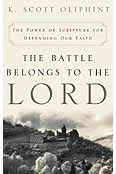
K. Scott Oliphint
Reviewed by: Alan D. Strange
The Battle Belongs to the Lord: The Power of Scripture for Defending Our Faith, by K. Scott Oliphint. Published by P&R Publishing, 2003. Paperback, 224 pages, list price $12.99. Reviewed by Professor Alan D. Strange (condensed from the Mid-America Journal of Theology, vol. 15, 2004).
Westminster Theology Seminary professor and OP minister Scott Oliphint has produced a work that should prove to be a great blessing to the church. Unlike many defenses of the faith from a Van Tilian perspective, this book is remarkably free of technical terms as it seeks to demonstrate that one who does apologetics needs a firm grasp of the hope within, being ready to give an answer to all who inquire as to the ground of our hope.
Apologetics needs to be carried on in a biblical mode, since a significant part of the problem is that "apologetics has become a largely philosophical discipline" (p. 2). To be sure, it is quite helpful, particularly for the pastor or others who would seriously engage a wide range of unbelieving thought, to be philosophically informed and able to apply the tools of reason and logic to apologetic encounters. Even then, for any Van Tilian, revelation must begin, end, and surround the encounter (either explicitly or implicitly), and reason must be employed ministerially and not magisterially.
Oliphint notes that "perhaps one of the most difficult things about the Christian life, and particularly about apologetics, is the balance of authority and gentleness that is required if it is to be practiced obediently" (p. 76). Otherwise, apologetics devolves into postmodernist relativism on the one hand or authoritarian arm-twisting on the other. Oliphint avoids the latter, knowing that apologists for the faith are commanded to be gentle and that the Holy Spirit must work in the hearts of those whom we would seek to persuade. He avoids the former by recognizing that apologetics, together with all theology, is grounded in the authority of God's Word. "Apologetics," Oliphint declares, "in many ways, is simply a battle over authorities" (p. 83). But it is not thereby reduced to a postmodernist "my-authorities-can-beat-your-authorities" position. No, the Bible is the only valid and ultimate authority; for this reason, "we are to let nothing turn our mind from following what God has said, from viewing the world in the way he has described it to us (p. 86).
That all unregenerate persons have a knowledge of God which they suppress means that all people are in a relationship with God - not a saving relationship, to be sure, but "a relationship nevertheless" (p. 126). Therefore, all people are without excuse and without a defense of their unbelief. This means that "any and every position that is opposed to Christianity is utterly indefensible" (p. 128). Oliphint argues that this truth needs to be burned into our hearts. I believe he is absolutely right in saying so. What we need most in the apologetic encounter is the humble conviction that the one opposing the truth ultimately has no defense.
This book is a rich encouragement for believers concerning all that they possess, understanding that in Christ are hidden all the treasures of wisdom and knowledge. It may even serve to unmask unbelievers as they continue in their fool's errand of denying the truths of the gospel; in this way, the book may lead them to Christ.
December 14, 2025
December 07, 2025
November 30, 2025
November 23, 2025
November 16, 2025
November 09, 2025
November 02, 2025
© 2025 The Orthodox Presbyterian Church